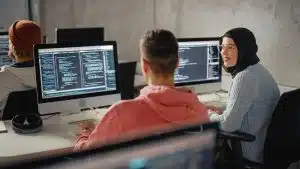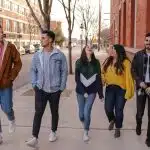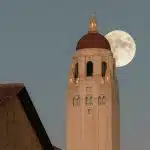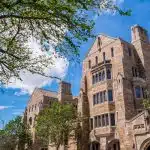Stanford University has general education requirements that all students should follow. Aside from that, each program has their own concentration and elective units you should also take up. With the hundreds of unique courses at Stanford, it can be hard to choose only a required few that can satisfy the curriculum and your curiosity. Today, we’ve picked out 15 classes you should take a look at.
- Unique Arts and Humanities Courses at Stanford
- Unique Science and Technology Courses at Stanford
- Unique Social Sciences Courses at Stanford
- Frequently Asked Questions
- Takeaways
Unique Arts and Humanities Courses at Stanford
Arts and humanities courses at Stanford let you explore human culture, thought, and creativity—letting you hone your critical thinking and analytical skills, and gain a deeper understanding of the human experience across time and cultures.
1. ARTSTUDI 101: Art Practice Foundation 2D
This course by the Department of Art & Art History will let you explore two-dimensional art media—such as painting, drawing, printmaking, and photography. This class involves a mix of lectures, practical workshop tutorials, and constructive critiques of student work, letting you immediately use what you learned from discussions and applying them to your craft.
You’ll also learn to translate concepts across various modes of expression, helping you hone a creative vision that goes beyond traditional media boundaries. Together with this, you’ll learn professional practices, such as:
- Understanding the various methods for professionally documenting your artistic creations
- Learning how to plan and present your work in an exhibition setting
At the end, you’ll have a good foundation of the basics of 2D art and be able to effectively present your work, visually, verbally, and in writing.
2. FILMEDIA 135: Around the World in Ten Films
This class is also offered by the Department of Art & Art History. We consider it one of the unique courses at Stanford since it explores cinema as a global language. This means you’ll get a comparative study of historical and contemporary aspects of international cinema.
You’ll look at the similarities and differences in storytelling, themes, and aesthetic approaches across different cultures and time periods, giving you a deeper understanding of shared human experiences and diverse cultural expressions.
This course will improve your analytical skills in interpreting films from different cultural contexts and develop a critical appreciation for cinema as both a universal art form and a culturally specific medium.
3. RELIGST 18N: What is Called Living?
From the Department of Religious Studies, this class will essentially delve into questions about human existence and how we understand the concept of “life.” You’ll discuss the ways we currently live and how we talk about life, letting you reflect on what “living” truly means in our modern context. Aside from that, you’ll also be looking at how other societies have lived and talked about life in ways that may be similar or different from ours.
To compare and contrast, you can expect to:
- Watch films
- Read novels and poems
- Go on field trips
- Have philosophical discussions
- Practice introspection
- Articulate your reflections through different formats (such as writing or vlogging)
This course can be a good introduction to the “life of the humanities” since it can give you a good foundation for cultivating critical inquiry, interdisciplinary thinking, and a deeper appreciation for the human experience by looking through different cultural and intellectual lenses.
4. CLASSICS 21N: Did Women Travel? A Digital History
This class by the Department of Classics is another one of the unique courses at Stanford, aiming to put the spotlight on the often-marginalized presence of women in traditional historical accounts of the ancient world. In this case, you’ll be looking specifically at travel, which was an activity often associated with men in the old days.
You’ll look into the anxieties and experiences of a travelling eighteenth-century woman to Italy. You’ll study evidence related to female mobility, challenging ideas about women’s confinement to domestic spheres—especially in those days.
You can expect to analyze traditional media (like books, maps, and manuscripts) and digital tools (like online databases and collections of both visual and textual material) to get a better understanding of the social, cultural, and historical contexts that shaped women’s lives and mobility in antiquity.
5. ILAC 194G: Black Brazil: Afro-Brazilian Music, Literature, and Art
Brazil had the highest number of enslaved people from Africa and was the last country in the Americas to abolish slavery. This course by the Center for Latin American Studies looks at how these two facts affected Brazil’s cultural history.
In this unique Stanford course, you’ll study the historical, social, and political contexts that have shaped Afro-Brazilian identity and its artistic manifestations across various media—specifically music, literature, and art. From the course title, you can expect to apply interdisciplinary methodologies, such as:
- Literary criticism
- Musicology
- Art history
- Cultural studies
- Social sciences
Doing so can help you more deeply understand how Afro-Brazilians have used different art forms to represent their experiences and challenge racism and social inequality.
Unique Science and Technology Courses at Stanford
Stanford’s science and technology courses emphasize problem-solving, research, and real-world applications, letting you be part of the innovation the institution is known for.
6. APPPHYS 100N: Powering the Future: How Physics Drives Green Energy
Offered by the Department of Physics, this unique Stanford course gives you a physics-centric perspective on the challenges and solutions related to green energy technologies. Some examples include the physics of:
- Energy production (such as fossil fuels, nuclear, solar, wind, hydro, and geothermal)
- Electrical transmission
- Storage (especially pumped hydroelectric and batteries)
You’ll also look at the potential of different energy sources and possible challenges of efficient energy transformation, transmission, and storage.
While it’s good to have taken high school or higher physics before taking this class, it’s also a good course if you’re just curious about the trade-offs of different energy sources or want to look at climate change and energy production from a physics perspective.
7. MATSCI 82N: Science of the Impossible
Things like integrated circuits and chemotherapy would have been thought to be only the stuff of science fiction in the early 1900s. In this unique Stanford course by the Department of Materials Science and Engineering, you can expect to learn about more scientific breakthroughs that were first thought to have been impossible, how they were made possible, and how they impacted society.
After those lectures, you’ll talk about technologies that seem impossible as of now and think about what technologies or discoveries are needed to make them a reality. You can also expect to lead a class discussion on the “impossible science” topic that you want.
8. HUMBIO 35: Your Body at Stanford: The Physiology of College
Have you ever wished that college came with a manual to help you navigate it? Well, this course by the interdisciplinary Human Biology Program is the closest you might get to that.
It’s one of the unique courses at Stanford that will essentially show you how your body functions and adapts to the specific stressors and opportunities of college life. For example, you may expect to understand and appreciate sleep more after learning how important it is for cognitive function, memory consolidation, and overall health. Other topics can include your body’s response to:
- Physical activity (or lack of it)
- Nutrition
- Stress
- Alcohol
- Caffeine
- Drugs
- Relationships
This class will give you the knowledge you need to help you optimize your health and performance in college.
9. CS 24: Minds and Machines
This class from the Department of Computer Science combines cognition, information, communication, and language and how they relate to both minds and machines. You can expect discussion on several core questions like:
- What are minds? You’ll explore different philosophical and scientific perspectives on the nature of consciousness and mental states.
- What is computation? You’ll examine the theoretical foundations of computation and its potential to model cognitive processes.
- What are rationality and intelligence? You’ll look at the nature of intelligent behavior in both humans and machines.
- Can we predict human behavior? You’ll discuss the complexities and limitations of modeling and predicting human actions.
- Can computers be truly intelligent? You’ll reflect on the philosophical and practical challenges of achieving artificial general intelligence.
- How do people and technology interact and how might they do so in the future? You’ll look into human-computer interaction and its evolving landscape.
10. OCEANS 141H: The Science of Extreme Life of the Sea
This class is offered by the Hopkins Marine Station, Stanford’s marine laboratory in Pacific Grove, California. You’ll look at how marine animals and plants have adapted morphologically, ecologically, and genetically to survive extreme habitats, such as:
- The deep sea
- Polar regions
- Hypersaline environments
- Oxygen-depleted zones
- High-energy places
- High-heat environments
This is one of the unique courses at Stanford also because it combines scientific rigor with narrative writing skills. Aside from marine science lecture materials, you can also expect tutorials on how to present science through creative writing—from memoirs to short fiction.
Because of the nature of the class, you’ll need to have previously taken up core courses in biology, creative writing, environmental sciences, or engineering.
Unique Social Sciences Courses at Stanford
Social sciences courses at Stanford give you diverse insights into human behavior, societies, and institutions. By exploring social structures, interactions, and policy, you’ll learn to analyze complex societal issues and prepare you for more impactful engagement with the world.
11. ECON 42: Economics of Voting
You may already know that democracies rely on citizens. But how big is the act of voting in a democracy? In this unique Stanford course by the Department of Economics, you’ll more deeply understand observed and political behavior and election outcomes through the lens of economics.
You’ll learn about the principles of different election-related topics, including:
- Voter behavior
- Common electoral systems
- Election campaigns and finance
- Election logistics
- Referenda
- Role of media and disinformation
- Citizenship in the Digital Age
You’ll also be able to look at the different ways the status quo can be changed through the voting of leaders at local, national, and global levels.
12. PSYCH 131A: How to Think Like a Shrink
This class by the Department of Psychology can help demystify the process of psychological assessment, diagnosis, and treatment. However, rather than being a class about mental health, this unique Stanford course will show you the complexity of our minds and the way we think and feel. You can expect a practical and accessible approach to understanding the mindset of a clinical psychologist
That means you’ll understand why therapists keep asking you about your early life relationships and learning. You might realize things like how your early experiences affect the relationships you have later on. Or why you might tend to point fingers when you’re scared.
At the end of the semester, you’ll have a better understanding of your mind and reactions and the psychology of everyday life.
13. PUBLPOL 149: The Political Economy of Tax Evasion
Taxation is like a social contract between the citizens and the state—and as with all contracts, not everyone follows it. Another one of the unique courses at Stanford, PUBLPOL 149 from the Public Policy Program will basically teach you about the interconnection of political forces, economic incentives, and tax evasion.
You’ll compare and contrast how international political economies enforce taxes and respond to noncompliance. This means you’ll also look at tax enforcement/evasion in different contexts like post-industrial capitalist societies, low-income countries, and war-ridden settings.
This course would be divided into two main parts:
- Tax evasion from a fundamental economic and policy perspective. You’ll explore why taxpayers evade paying taxes and how tax authorities deal with noncompliance.
- Political aspect of tax evasion. You’ll look at the political causes and effects of tax fraud and when governments become stricter with enforcement.
14. HISTORY 4A: The Global Drug Wars
This class by the Department of History will give a historical analysis of the complex and far-reaching phenomenon of drug production, trafficking, consumption, and the various attempts to control them across the world.
You can expect lectures on the following topics:
- Medical and social controversies of certain drugs
- Political economy of drug trafficking
- Cultures of drug use, addiction, and treatment
By tracing and analyzing the evolution of drug production, trafficking, and control across different times and regions, you’ll gain a more nuanced perspective on the history and ongoing debates surrounding drug policy.
15. PHIL 86: How to Make a Moral Agent
This thought-provoking and unique Stanford course by the Department of Philosophy will talk about the philosophical foundations of morality and the complex question of what makes a moral agent.
In this class, you’ll try to understand the way humans think, the kinds of artificial minds we can and want to make, and if it’s possible. You can expect discussions on whether advanced AI systems like ChatGPT can be moral agents. After all, is it bad if you lie to ChatGPT or is it anyone’s fault if ChatGPT lies? You’ll also try to determine what makes humans moral agents. Is it our capacity for reason or feeling others’ pain?
You can expect readings from philosophy, deep learning, and the cognitive sciences.
Frequently Asked Questions
1. What course is Stanford best for?
Some high-ranking programs that Stanford is known best for include computer science, engineering, psychology, and economics.
2. What are the best classes at Stanford?
The best classes at Stanford for you are the ones that interest you, are connected to your major, and align with your academic and professional goals. For instance, if you’re thinking of wanting to be a therapist and are already curious about the process of psychological assessment and treatment, then Psych 131A might be good for you. If you love marine biology and are curious about deep sea life, then you may want to consider taking up Oceans 141H.
3. What are Stanford mini courses?
Stanford mini courses are short, intensive courses that are one to three weeks long. They’re offered by different departments to graduate students to gain focused training in a specific subject without committing to a full quarter.
Takeaways
- There are many unique courses at Stanford that can help you fulfill requirements in your curriculum. You can check their catalog every semester to find classes.
- There is no objectively one best class in Stanford since what’s best for you depends on things like your interests and goals. Use academic planning resources if you’re really unsure of what you should take.
- Are you eyeing any of the unique Stanford courses we listed above? Consult an admissions expert to help you build a college application that will increase your chances of getting accepted.

Eric Eng
About the author
Eric Eng, the Founder and CEO of AdmissionSight, graduated with a BA from Princeton University and has one of the highest track records in the industry of placing students into Ivy League schools and top 10 universities. He has been featured on the US News & World Report for his insights on college admissions.




















